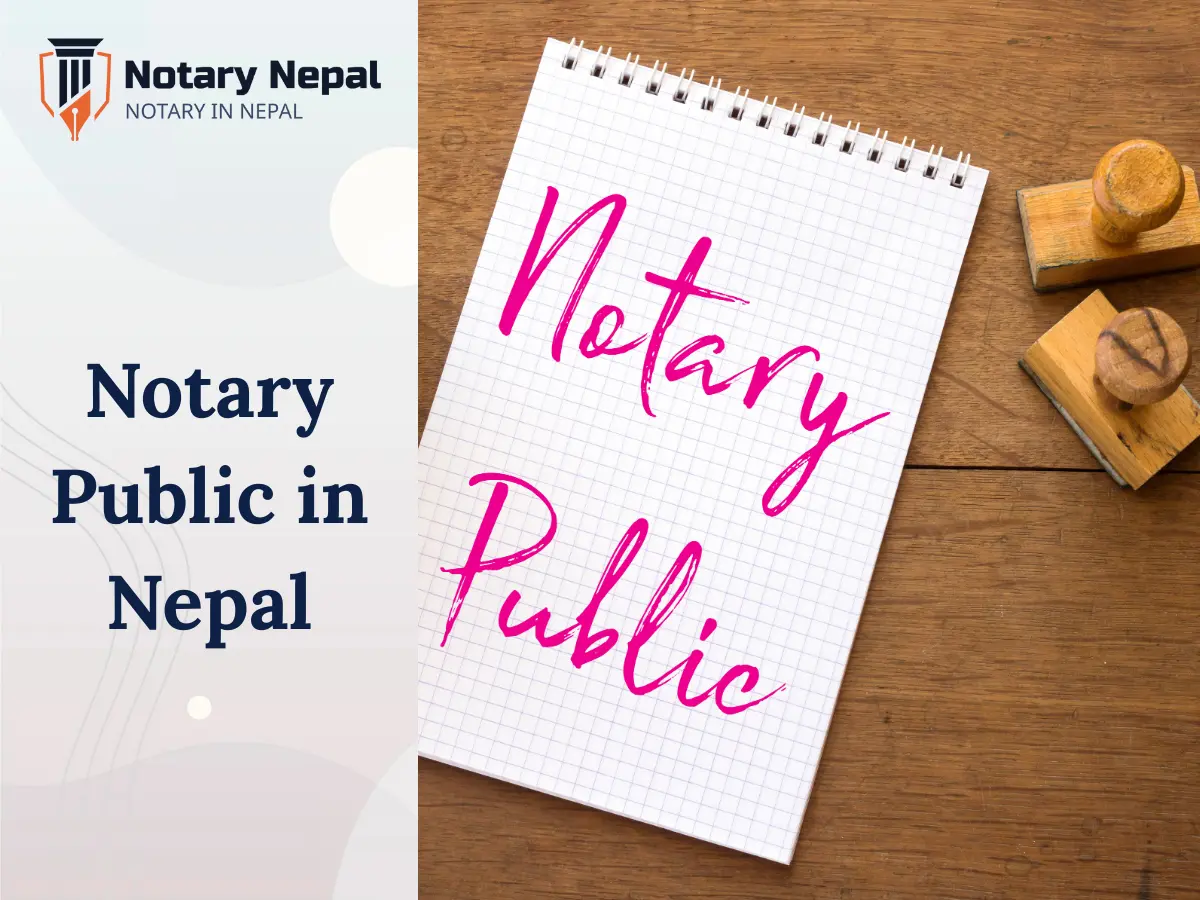

Table of Contents
In a rapidly globalizing world, notarized documents have become indispensable for both individuals and businesses. Whether you're planning international travel, studying abroad, or entering into legal agreements, a reliable Notary Public in Nepal is your gateway to ensuring document authenticity and global acceptance. Let's dive deep into everything you need to know about notary services in Nepal!
Comprehensive Notary Public Services in Nepal
Finding reliable notary public services in Kathmandu or anywhere else in Nepal doesn't have to be stressful. At Notary Nepal, located conveniently at Anamnagar, Kathmandu, we offer a comprehensive range of professional notary services tailored to your specific needs. Whether you need certified notarization nearby or require online notary services, we've got you covered!
Quick and Easy Online Notary Services
Online notary services have transformed how documents are verified. At Notary Nepal, our digital notarization process is swift, secure, and accepted globally. It's perfect for individuals who prefer convenience without compromising legality.
Mobile Notary Public at Your Doorstep
Can’t visit our office? No worries! Our mobile notary public services bring expert verification directly to your home or office in Kathmandu, Lalitpur, or across Nepal.
Document Notarization Simplified
Document notarization ensures your documents hold legal validity. We specialize in:
- Marriage Certificates Notarization: Essential for visa and immigration purposes.
- Educational Documents Notarization: Crucial for higher education admissions abroad.
- Legal Document Notarization: Ensuring your agreements are legally binding.
- Birth Certificates: Quickly notarized for global acceptance.
- Translation & Notarization: Accurate translations combined with notarization services for full authenticity.
- Affidavits: Clearly outlined notarization procedures for affidavits.
Expert Document Legalization and Certification
Legalization and certification services are crucial for international validity. At Notary Nepal, we handle everything:
- Document Legalization Services: Quickly authenticate your documents for use abroad.
- Apostille Services: Everything you need to legally certify documents internationally.
- Embassy Attestation Services: We simplify the complex process of embassy attestations.
- Foreign Document Legalization: Essential for using foreign documents in Nepal.
- Educational Document Certification: Fast-track your educational certifications effortlessly.
Our specialized certification and legalization services ensure seamless international recognition and acceptance.
Foreigner Marriage Notarization and Translation Services
Marriage notarization, especially involving foreigners, requires careful handling:
- Foreigner Marriage Notarization: Our experts ensure your marriage documents are valid globally.
- Marriage Act Translation: Understand the requirements clearly with precise translations.
- International Marriage Document Notarization: Swift handling to meet international standards.
- Marriage Verification Services: Verifying marriage documents accurately and efficiently.
Our goal is to ensure clarity and compliance at every step of your marital legal journey.
Multilingual Notary and Translation Services
Language should never be a barrier:
- Multilingual Notary Services: Catering to diverse linguistic needs.
- Multilingual Document Translation and Notarization: Accurate and quick services available.
- Chinese, Spanish, French, Arabic, Japanese Documents: Specialized notary services tailored for each language.
SOP Notarization and Certification Services
For students aiming to study abroad:
- Statement of Purpose (SOP) Notarization: Make your SOP credible for international applications.
- SOP Translation & Verification: Ensure your documents reflect the highest accuracy.
- Student Documents and Visa Notarization: Quick notarization to support visa applications.
- Educational SOP Translation: High-quality translations ensuring your statements convey your ambitions effectively.
Unofficial and Personal Document Notarization
Even unofficial or personal documents often require notarization:
- Personal Letters Notarization: Ensuring informal documents carry official weight.
- Private Statements & Informal Documents: Quickly notarized without complexities.
- Non-Legal Documents: Get official notarization without hassle.
Understanding Notary Public Costs in Nepal
Cost transparency is essential:
- Notary Public Fees in Nepal: Clear pricing tailored to each document type.
- Cost of Marriage Document Notarization: Know exactly what to budget for notarizing marriage certificates.
- Cheapest Notary Public Services: Providing affordability without compromising quality.
Legalization and Certification Clarified
Knowing the difference between legalization and certification is crucial:
- Certification vs Legalization: Clearly explained to help you choose what suits your needs.
- Educational Document Certification: Avoid complications with our straightforward certification processes.
Multilingual Document Verification Made Easy
We recognize Nepal's cultural diversity and its international connections. Our multilingual notary and translation services bridge language barriers, allowing easy and hassle-free notarization in various languages including Nepali to English, English to Nepali, and more.
Foreigner Marriage Act Translation
Marriage involving international parties has strict requirements. At Notary Nepal, we ensure accurate translation of marriage acts, helping you fulfill all legal formalities easily.
Additional Services Offered by Notary Nepal
Beyond traditional notarization, we also offer:
- Property Valuation: Certified valuations essential for property transactions.
- Website Localization Services: Tailoring your website content to resonate with local Nepali audiences.
- Appeal Letter Writing for International Students: Expertly crafted letters to support your study abroad appeals.
- Property Valuation: Accurate property assessments validated officially.
Why Choose Notary Nepal?
At Notary Nepal, we pride ourselves on being the most trusted and professional notary service provider in Kathmandu, Lalitpur, and across Nepal. Our experts are available Sunday to Friday, 10 AM – 6 PM, with 24/7 support available via phone and email.
Contact Us Today
Ready to notarize your important documents or need expert translation services?
- Phone: +977 9765979296
- Email: info@notarynepal.com
- Hours: Sunday to Friday, 10:00 AM - 6:00 PM (Closed Saturdays, Support 24/7)
- Website: Notary Nepal - Online Notary in Nepal
Take Action Today!
Don’t let document authentication delay your dreams. Whether you're a student, professional, traveler, or business owner, Notary Nepal is your trusted partner for all notarization, translation, and legalization services. Take your next step confidently with our reliable, efficient, and comprehensive notary services in Nepal.
Ready to ensure your documents meet global standards? Contact Notary Nepal today!
This article is for informational purposes only and does not constitute legal advice, advertisement, or solicitation. Notary Nepal and its team are not liable for any consequences arising from reliance on this information. For legal advice, please contact us directly.


